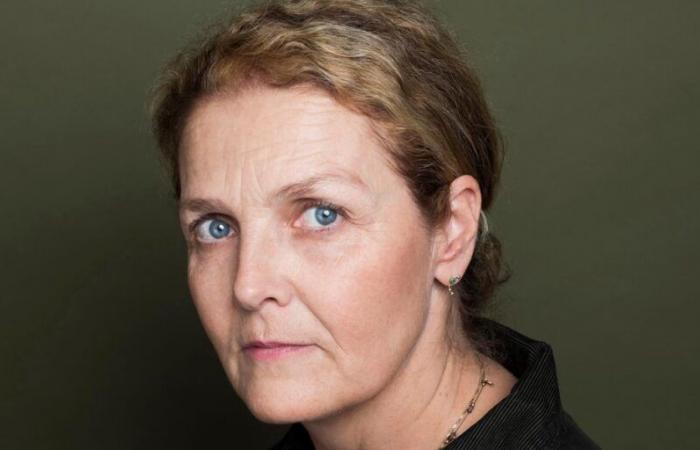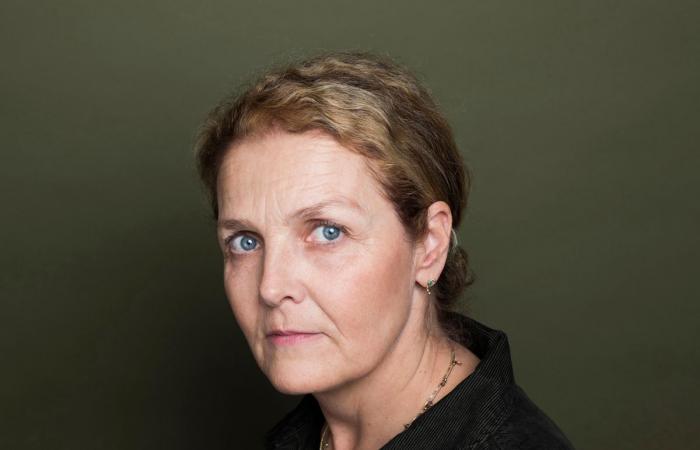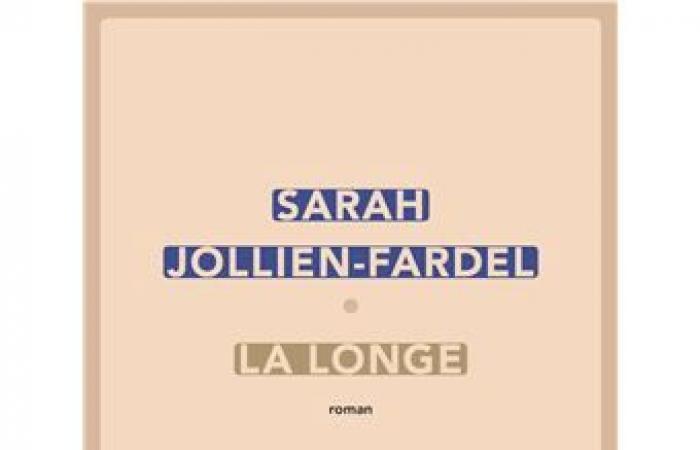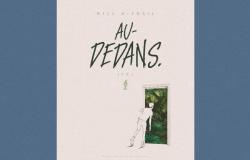French-speaking literary outing –
With “La loin”, Sarah Jollien-Fardel confirms her unique style
After “Her Favorite”, the Valais author returns with a gripping tragic and luminous novel, anchored to her native land. Interview.
Published today at 07:00
Sarah Jollien-Fardel is back with a highly anticipated second book: “La loin”.
© Ph. Matsas / Sabine Wespieser Editor
Subscribe now and enjoy the audio playback feature.
BotTalk
- Sarah Jollien-Fardel publishes a new novel entitled “La loin”.
- His previous book sold more than 50,000 copies.
- His new novel addresses the difficult theme of losing a child.
- The author believes in the consoling power of literature.
In 2022, “Her favorite”Sarah Jollien-Fardel’s first novel, told the story of Jeanne, a mountain girl raised with a violent father, and her path to recovery from this damaged childhood. Noted both in Switzerland and in France, this harsh and poignant text, published by the small and qualitative Parisian house Sabine Wespieserenjoyed public success with more than 50,000 copies sold, but also critical success, with a selection for Goncourt. The Valaisanne returns this Thursday, January 9 with “La longe”, where she tackles another difficult subject: the loss of a child.
There we find a harshness that resonates with the brute force of the mountains and the desperate madness of Rose when her daughter Anna, still a schoolgirl, is mowed down on her bike by a van. Comfort will come three years later, with a singular saving initiative of which we will preserve the surprise. But also memories drawn from a childhood spent at altitude. A time, however, already mourned by the suicide of the heroine’s own mother, who everyone said had “the beasts”. Rose was only 8 years old then. She remembers it when she finds herself trapped, held by a tether, in a mysterious wooded room.
A gripping and tragic story but without tears, which aptly summons this rough and taciturn Valais, including a very beautiful portrait of a grandmother who is a bistro owner and a bit of a librarian. Both sad and bright, this short and powerful novel can be read in one go. In this ode to nature and literature, where we encounter the figure of Ella Maillart, the tomb and the words of Rilke, we find the musicality of the sentences and the accent of “Her favorite”.
At this point you will find additional external content. If you accept that cookies are placed by external providers and that personal data is thus transmitted to them, you must allow all cookies and display external content directly.
Allow cookiesMore info
To talk about it, Sarah Jollien-Fardel welcomes us to her home, in her house with large bay windows which create so many paintings of the surrounding mountains, an inspiring haven a few minutes by car from the traffic of the cantonal road which leads to Sion. The author evokes the difficult turn of the second novel, her belief in the power of words, and the precious perspective of her editor.
After the success of “Her Favorite,” how did you experience the delicate transition to the second novel?
For the first, I expected nothing and I discovered everything. I was thrilled to be published and thrilled with the reception. For the second, I put pressure on myself and I really didn’t feel free anymore. I started thinking about the reader, wondering what I could or couldn’t say, I felt this weight on my shoulders. It was very difficult for me to break away from that.
To the point that you went directly from the second to the third book: before “La loin”, you wrote a text that your editor refused…
Effectively. I worked on it for thirteen months, but I didn’t have enough perspective on my subject. This book will certainly come out one day, but in another form… In the meantime, it has allowed me to discover a lot of things about my own writing. A bit like a year of specialization.
Was this beneficial for this third text?
Yes. The day after my editor’s refusal, I had the idea for “La loin”. Two days later, at 6:15 a.m., I started writing. I was constantly doubting, but when Sabine (Editor’s note: Wespieser) encouraged me to continue, everything fell into place in an almost magical way, a bit like Tom Thumb following the stones, because the whole story was within me. It was February 2024, and I turned in the first draft at the end of August. There were no more weekends, vacations, friends. It was dense but also incredible.
After domestic violence, you write about a mother who loses a child, after having lost her mother. Do you have a weakness for tragic heroines?
Perhaps, but it is the characters who choose their subject. I was walking near here, along the river called Morge, when the couple Rose and Camil appeared to me. Afterwards, my obsessions and concerns come out in one way or another, including violence in all its forms and death. But I also wanted to show that, despite what we experience is very difficult, we can still succeed in seeing beauty.
As in “Her Favorite”, your heroine tells her story in the first person, but the plot is not autobiographical either?
No. The anchoring and very realistic narration may give this impression, but it is not the case. The two main places exist, even if I didn’t want to name them, because it would freeze things too much. And then, for example, when I talk about major works, it is in reference to the construction of the Grande Dixence dam. I also put my own relationship with my grandmother and with older women in general. And my in-laws are bistro owners, so I know what this job is that I lend to Rose’s grandmother.
It’s also a very beautiful love story…
It wasn’t planned… I knew Rose and Camil loved each other a lot, but not if they would still be together at the end.
We learn straight away that the heroine is attached to a tether, like the one used to lead horses, but then discover why and by whom causes a shock…
When I was writing, I had this expression in mind: “What would you have wanted to do anyway, other than tie him up?” For me, it’s perhaps much sweeter than for the reader who doesn’t know what’s going to happen. And then the lanyard is educational, it’s not a leash. It was voluntary. And purely romantic.
This book is above all a story of resilience…
I don’t like this word, but I accept it. In “Her Favorite”, I found it important to show that not everyone is resilient, that we have the right not to succeed. This time, I knew from the first page that the heroine would be saved, even if paradoxically, as a reader, I don’t like novels that end well.
Your heroine will be able to rely on words. You cite extracts from Duras, Rilke or Charlotte Delbo. Do you believe in the consoling power of literature?
Yes, I am first and foremost a reader, and I do not read to entertain myself, but to learn, discover, understand, be shocked or justly consoled.
However, silence is also important in this novel…
Yes, I wanted to. There is subtext and room for the reader. And that goes with Valais and the mountains: at the time I grew up and to which I refer, it was rather silent, but these silences meant something.
The glossary at the end of “Her Favorite” caused a reaction. You are republishing, why?
I didn’t want it, but Sabine Wespieser, who is French, didn’t know certain words like pive or home. Replacing them with pine cone or retirement home didn’t work, so I resorted to explaining them at the end.
Despite the loss of her mother, the heroine will believe in her luck, encouraged by her grandmother. The little girl then thinks that nothing worse could ever happen to her…
Yes. This is completely naive and corresponds to his childhood perception. It was also my way of showing how much the grandmothers of my generation believed in their granddaughters, in their chance to do everything that they themselves had not wanted or been able to do.
“The long time”, Sarah Jollien-Fardel, Ed. Sabine Wespieser, 160 p.
“The Tribune of Books”
The “Tribune de Genève” offers you shared readings, reviews, book news, reports and your favorites.
Other newsletters
Log in
Did you find an error? Please report it to us.
0 comments








